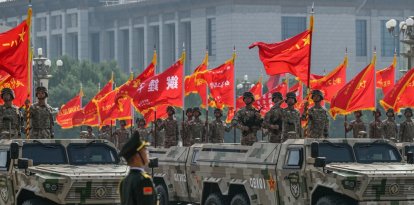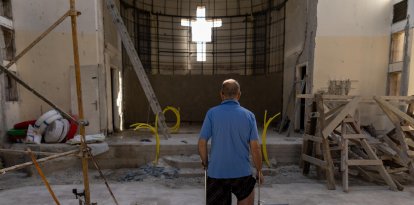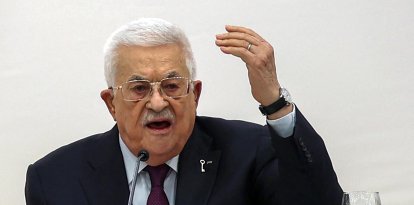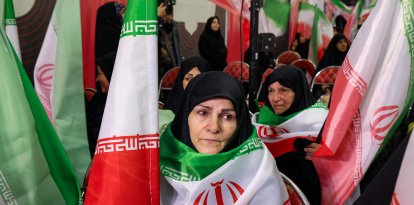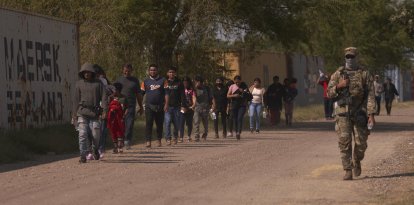"Hostage diplomacy," a game we don't know how to play and cannot win
Kidnapping a person and using him as a shield to subdue an opponent is a type of action that has existed for as long as war has existed. In all cases, the one who values the lives of his own and others the least has the advantage.

Hamas terrorists in Gaza
The so-called "hostage diplomacy" has been a resource masterfully exploited by Iran since the ayatollahs' regime took over the country in 1979. Since then, it has not ceased to be implemented and exported as a doctrine of war to its allies, be they autocracies or terrorist groups. Recently, the case of the Italian journalist Cecilia Sala, arbitrarily detained in Iran to be exchanged with the Iranian agent Mohammad Abedini; is a clear example of the absolute supremacy that, in this game, the most nefarious characters of world geopolitics have.
Recognizing this diabolical supremacy and developing tactics and strategies to combat this weakness should have been a fundamental premise of liberal democracies in their struggle to preserve their system of values and model of life, in the face of their enemies. However, the West is in retreat as the most brutal models advance, and its desire to win became in reality a willingness to appease, maintain the status quo, and tolerate all cultures of death. The West stopped doing its part while its enemies advanced, and now hostage diplomacy, in addition to representing a human rights problem, is a gigantic security problem.
Kidnapping a person, holding them captive, harming them in doses to keep him alive and using them as a shield to break an opponent is a type of action that has existed as long as war has existed. In all cases, the one who values the lives of his own and others the least has the advantage. In a culture based on respect for human rights, such as liberal democracies, the disadvantage against those who use even the cradles of their own children as war barracks is abysmal.
But in recent decades, and particularly in this century, hostage diplomacy has become a well-oiled system of warfare for autocracies and global jihadism. From massacres followed by kidnappings such as the daily occurrences perpetrated by Islamist groups in various parts of Africa or the prime example of the October 7 attack on Israel; to incidents of unjust detention that dictatorships organize by instrumentalizing their rigged criminal justice to take hostages under the guise of the law; it is a growing mechanism that has given significant gains to the enemies of the West. Some exchanges are one-on-one, while Islamism often obtains a broader set of concessions as part of geopolitical appeasement deals.
The victims of hostage diplomacy are vast, with diplomats, journalists, dual nationals, aid workers, families, artists, mostly civilians who should be out of the war effort.
It goes without saying that getting the hostages home is of vital importance for democratic countries. Just putting yourself in the shoes of both the victims and their families takes your breath away, we are talking about unbearable pain, and a social wound that does not heal. It is also a topic that is installed in the public conversation, much more than any other action of conventional war. That is why the fact that this is a war action is often lost sight of. Certainly a favorite of those unaccountable to the international rule of law.

Opinion
Ceasefire agreement between Israel and Hamas: The Jewish state must continue to win
Leandro Fleischer
For example, Russia recently exchanged a group of hostages arbitrarily detained without due process and held in inhumane prisons. In exchange it brought back its spies and assassins. The deal worked out well for Putin, who knows how to move with impunity in the realm of geopolitical faits accomplis. This policy exposes to a real risk all those people who set foot on soil under Russian interference and who can be instrumentalized by Moscow.
Nicolás Maduro has taken captive people from the United States, Ecuador, Argentina and several other nations that he has been using to exchange for criminals of the regime such as the narco-brinos, skillfully deceiving governments such as the United States. It even has the Argentine embassy in Caracas under bloody siege, as if it were a medieval siege, where opposition leaders are refugees subjected to inhuman privations.
The fact that a Government of agile criminals such as the Venezuelan one can outwit the diplomacies of other nations where the rule of law prevails, shows the deep weaknesses of a war doctrine that refuses to face a serious diagnosis about the immediate future of war in the world.
Thus, an abyss opens up for the West with regard to hostage diplomacy, because its enemies use its own scale of values against it. While hostage diplomacy advances, the West barely manages to do damage control and gestures of grandiloquent impotence.
The case of the latest agreement between Israel and Hamas, sponsored by the United States and Qatar, is part of this logic. Israel is a militarily superior country, which has accomplished a warlike feat simultaneously on several fronts, withstanding the pressure of its own allies to prevent an absolute victory, and it turns out that it is forced to sit down to negotiate with a headless enemy, almost fulminated and which is not subject to scrutiny or to the rules of the international codes of warfare.
In order to dimension the absurdity, it is necessary to imagine the allies being forced to sit down to negotiate on equal terms with a defeated Hitler who cannot take his nose out of his bunker. Unthinkable, isn't it? Something insane has happened to the West that no longer dares to win wars. Without this self-inflicted weakness, the advance of hostage diplomacy would be incomprehensible.
At the time of writing these lines, the agreement has already gone through several comings and goings, it has been considered closed, then fallen and then returned to the arena, so that it is impossible to know how it can end given its complexity and fragility. But leaving aside the dizzying juncture of these hours, in the long term what must be analyzed is that we are talking about an "agreement" with a defeated enemy that imposes conditions; all thanks to hostage diplomacy.
In principle, what has emerged from the agreement—whose fine print remains hidden—is so unfair, unequal, and incoherent that its defenders in Israel and the United States justify it under the assumption that there is "something else we don't know," some added element that could balance the tilted chessboard. To make matters worse, the agreement is structured into three interdependent phases, yet their fulfillment is unclear—along with the war’s end or even the duration of the cease-fire.
But since its announcement, divisions within Israeli society deepened, while celebrations within Gazan society became evident. Thousands of Palestinian "civilians" took to the streets to show their joy; while in Israel, marches in Jerusalem against the agreement contrasted with those in Tel Aviv in favor of it.
The political tensions arising from this agreement have once again highlighted the tenuous state of the Israeli ruling coalition, within which many leaders point out the obvious: Sinwar, the mastermind of Oct. 7, was released in an earlier hostage exchange. Every hostage exchange predicts the kidnapping and massacre of Israelis in the future.
The other uncomfortable truth results from the realization that the objectives of the war in Gaza were an entelechy. It was not possible to wipe out Hamas and at the same time guarantee the lives of all the hostages. Sinwar planned this from the beginning, that is why his orders were to take hostages at any cost, that is why you saw well-equipped Palestinian soldiers doing it, but also ragtag freelancers of rapine doing their job, even those brainless hyenas understood what the rules of the game were.
Hamas needed the hostages for its survival and not even with the destruction suffered in these months was willing to hand them over; while the Israelis faced not only ideological divisions but the heartbreaking dilemma of continuing to lose hundreds of their sons to war or leaving the hostages in the hands of a heinous enemy. Golda Meir's wise words about Israel's enemies hating Israelis more than they love their children makes particular sense in this dilemma.
The turbulent U.S. political situation of the past year was also a determining factor in the war in the Middle East. Discursively, Biden and Trump were at loggerheads over ways to "support" Israel. With just days to go before Donald Trump takes office, the deal seems destined to give the president-elect a head start that positions him strategically in the region, and Israel likewise as his ally.
Much has been said about reenacting a Reaganite scenario, alluding to January 20, 1981, when at his inauguration, Ronald Reagan won a resounding victory in the war against Islamism.
When Ayatollah Khomeini overthrew the Shah of Iran in early 1979, he installed an Islamist regime with the goal of enforcing sharia. In late 1979, his followers seized the U.S. embassy in Tehran, demanding the surrender of Shah Mohammed Reza Pahlavi as a bargaining chip. This encouraged Islamist attacks against Americans in Africa, the Middle East and Asia. Carter, who was on his way out, adopted appeasement strategies and the eternal economic sanctions, while Ronald Reagan, as president-elect, adopted a threatening posture. His uncompromising policy succeeded that day in getting the brand-new dictatorship of the Islamic Republic of Iran to release the American hostages after more than 400 days in which they were held captive.
But Reagan's story will not be repeatable on the basis of this deal, as most of the hostages will remain in Hamas' hands when Trump takes office on Jan. 20. However, according to the details that are known, Israel will have complied with that scenario desired by Donald Trump, possibly in exchange for better positioning on other regional issues, such as improved flow of arms and funds, destruction of Iran's nuclear program, support for a buffer zone in both Syria and Lebanon, progress on the Abraham Accords, or a change of direction and policy at the UN or the ICC.
However, it is crucial to face the facts that the agreement will bring: dozens of hostages, dead and alive, will remain in Gaza. The Israelis will continue to send their soldiers to war without knowing what all their sacrifices were for. It is unclear how far control over the Philadelphi Corridor will be maintained, but the withdrawal of troops will ensure that Hamas will survive, especially if the Netzarim Corridor is abandoned. The release of terrorists is not only a security threat, but also the propaganda Hamas needs to gain manpower, legitimacy and loyalty.
Hostage-taking will have been transformed into the best method of Palestinian "resistance." Marches in the West in favor of "the Palestinian cause" have already shown that this narrative has the support of the global left.
The agreement increases humanitarian aid, 600 truckloads of supplies will enter Gaza daily, which will again be appropriated by Hamas to expand its power of subjugation and recruitment. Hamas, still diminished, will remain in power, and the Palestinian Authority will no longer be able to govern the territory that the terrorist organization took from it. In other words, Hamas will continue to increase its prestige in Judea and Samaria in Palestinian eyes. Qatar, a state sponsor of terrorism, financier of global jihadism in universities and Western media, supporter and protector of Hamas, will gain influence in the US and the Middle East, even if Iran's influence wanes.
In a contest of egos, the president-elect and the outgoing president have claimed the "success" of the agreement which, with all the uncertainties, undoubtedly offers hope to the families of the hostages. It is claimed that Hamas gave in on three of its four key demands, without taking into account the negotiation logic of a shuk (Arab market) in which the terms of the exchange are exaggerated in order not to lose during the negotiation. That the terrorist organization is imposing even a single condition is a triumph on its part. After more than a year of war, Hamas' ability to dictate terms is bound to be reduced, but for their own reconstruction they need only sell the agreement as a victory. With this and the money that has already started to flow to Palestinian organizations from the European Union and international agencies, reconstruction will begin.
The image of Hamas soldiers celebrating in Gaza, after disguising themselves in civilian clothes highlights the threat they represent, Hamas has suffered losses that it celebrates as martyrdoms, it will not mourn its dead, it will instrumentalize it as it always did, its ability to regroup still exists.
In this sense, this agreement reinforces the fact that hostage diplomacy produces tangible benefits, that is why hostage diplomacy, on a global scale, has been on the rise; both on the part of autocracies and on the part of terrorist groups and opens the way for it to also become a profitable geopolitical business that can be outsourced. This is what war will look like in the coming years, and the free world must seriously and urgently consider a realistic war doctrine. Otherwise, there will be more October 7s to come, and they won't just happen in Israel.
















